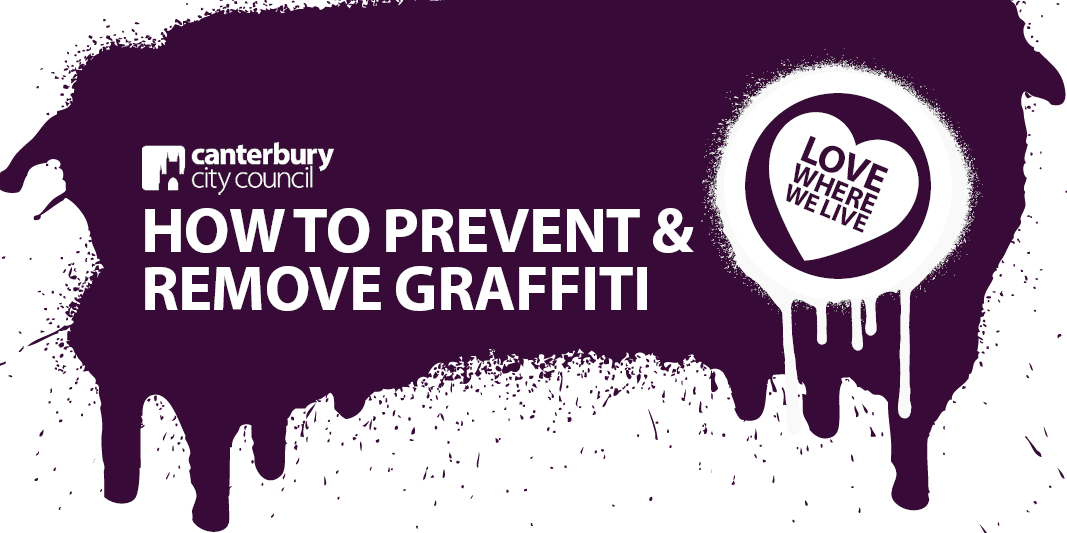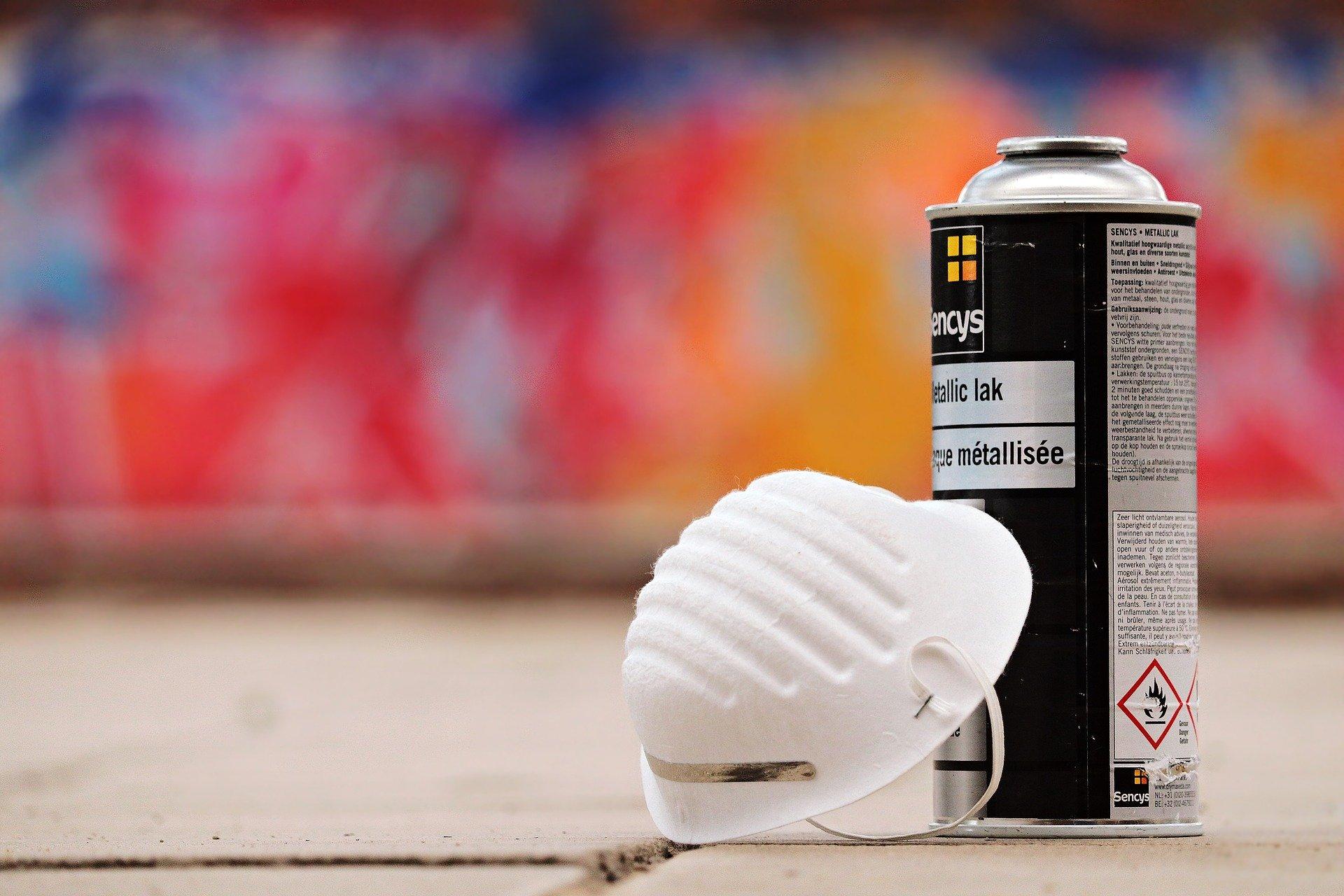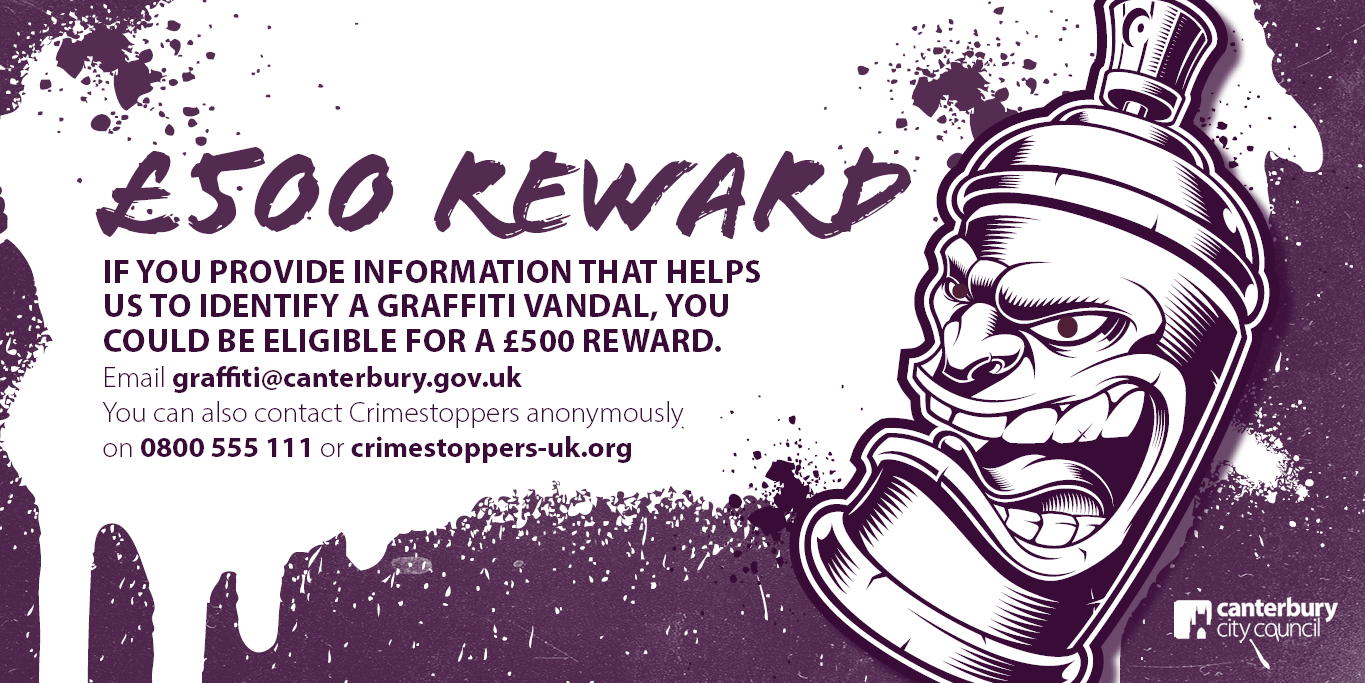Graffiti Removal and Prevention
Graffiti Toolkit

Graffiti is writing or drawings made on a wall or other surface, usually without permission and within public view. Graffiti can take many forms including tags, slogans and graffiti painting. Illegal graffiti is criminal damage.
Often the starting point for crime, graffiti is mostly carried out by young people and is frequently associated with anti-social behaviour and gang culture.
It is also costly to remove. Every year, cleaning up graffiti in our district costs council taxpayers thousands of pounds. This takes away money and resources from key frontline services such as tackling homelessness.

Our approach
Canterbury City Council and Kent Police are working closely together with support from others to tackle graffiti.
We have produced this online toolkit to support property and business owners in the prevention and removal of graffiti and to update residents on the action we are taking to deal with this issue across our district.
We offer free graffiti removals

Canterbury City Council will remove graffiti from your home free of charge up to four times a year.
If the graffiti is on your business premises, we will remove it for free twice a year. You will need to report all graffiti to us online and request its removal using the form provided.
We aim to:
– remove offensive graffiti within 24 hours
– remove non-offensive graffiti within four working days
Each removal is a maximum of 5sqm or up to two hours cleaning/painting.
How to report graffiti
Last year, the council launched a new online graffiti reporting system that allows people to report new or existing graffiti in minutes.
Residents can use their smartphone to attach photographs and drop a pin on a map to quickly identify the exact location of the graffiti so that it can be cleaned. Once the graffiti has been removed, we will inform the person who reported the vandalism.
It is also important to report the criminal damage to Kent Police.
If you see someone doing graffiti you should call 999 and report it as a crime in progress.
Although we’re not responsible for utility boxes in Canterbury, we will inform the owner if you report graffiti.
We’ll also need to contact the property owner where graffiti is reported on private or business premises. That means we cannot directly control the amount of time it will take for the graffiti to be removed.
Graffiti reward scheme

If a member of the public provides information that helps us to identify a graffiti vandal, they could be eligible for a £500 reward. Information can be sent to graffiti@canterbury.gov.uk.
Working with others
Canterbury City Council is also working with other organisations to tackle and prevent graffiti across the district.
For example, we share information about tags and criminal offences with Kent Police.
The Canterbury Connected Business Improvement District (BID) has also paid to clear graffiti from properties in the city centre.
Our other partners include Community Payback, Restorative Justice, Neighbourhood Watch, Kent Highways and Kent County Council wardens among others.
Our responsibility for cleaning graffiti
We are responsible for cleaning graffiti on council property but we cannot clean it off of private premises without the owner’s permission.
We encourage property owners to report graffiti and to get it removed using our free service or through their own contractors.
There is a whole host of preventative measures owners can take to avoid becoming the victim of further vandalism.
Waivers

We will need a waiver completed by the property owner (or authorised person) to give us permission to remove the graffiti. A waiver is a signed document containing an agreement between you (the property owner) and us (the council) to carry out the removal.
If we cannot get a signed waiver from a property owner, including organisations like Network Rail or Openreach, enabling us to remove graffiti it might stay there for a considerable period of time.
Community Protection Notices
If a property owner does not remove graffiti as requested by the council, our Environmental Enforcement Team will consider issuing a written warning stating that if the graffiti is not removed, a Community Protection Notice (CPN) will be issued. We may then have work carried out to ensure the failure to remove graffiti is set right. The property owner may be obliged to cover these costs. This allows us to reduce the negative impact graffiti has on our community.
A breach of a CPN could lead to a fine of up to £2,500 for individuals and £20,000 for businesses.
What does the law say about graffiti?
Graffiti can be considered an act of criminal damage. Under the Criminal Damage Act 1971, anyone caught doing graffiti can face a prison sentence of up to 10 years or be fined if the damage costs more than £5,000. If the damage caused is less than £5,000, an offender could face three months in prison or a fine of £2,500.
Under the Anti-Social Behaviour, Crime and Policing Act 2014, a civil injunction can be imposed on an offender and this applies from the age of 10.
Selling spray paint to someone under 16 is illegal and shopkeepers can be fined up to £2,500 if they are caught.
Graffiti prevention

There are ways to prevent graffiti that include minimising access to your space, through clever planting for example, and keeping your property neat and tidy.
Other measures can include installing security cameras, improving lighting in the area and applying protective coatings, murals and vinyl wraps.
A comprehensive guide to graffiti prevention can be found online.
You can also seek our advice at the council and work with your local Neighbourhood Watch scheme.
Remove graffiti quickly
If you become a victim of graffiti, we encourage you to remove it within 24 to 48 hours. If you remove it quickly, there is very little chance of it becoming a recurring problem.
If the graffiti is in a public area next to your property, please report it as soon as possible.

© Canterbury City Council 2020 – page last updated September 2020
Published: 19 August 2020